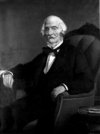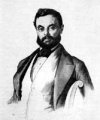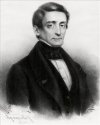The End of the Beginning
Part 6: Langobardia Capta Ferum Victorem Cepit
Verona, Guardia Nuova - 12 May 1848, Afternoon
The delegation of the Romagne, accompanied by Marquis d'Azeglio, was ushered into the same conference room used for the Roman delegation, to declare their intentions with regards to the Italian Confederation.
Ferdinando thought it was an eerie repeat of what happened in the morning. Signor Minghetti stated that the vote to secede from the Papal States and to apply for membership in the Confederation had been unanimously taken by the delegates convened in Imola, and that these decisions were irrevocable. He also added that a Provisional Government had been formed, elections had been called for a Constitutional Conference, which would also serve as interim Parliament. The only difference, and not a minor one, was that the delegates had voted the formal decadence of their allegiance to the Pope, and the creation of a new constitutional monarchy, to be named Grand Duchy of the Romagne: the delegation to Verona had been instructed to offer the crown of the new principality to Prince Ferdinando, in personal union and on the same basis of the agreement recently accepted by Lombardy.
The representatives of the Confederal States had already been briefed about the events in the Romagne, and the speech of signor Minghetti did not surprise anyone.
Prince Ferdinando spoke in answer: "Honorable Delegates of the Romagne, you are welcome in Verona and we are glad to have confirmation of your intention to become members of the Italian Confederation. The signature of the documents for your entry in the Confederation will be done the day after tomorrow, but I can tell you that there will be no one to object. I also thank you for the honor you make to my House, and to me personally, with the offer of the crown of Romagne, but, albeit regretfully, I cannot accept it in good conscience. I am already under obligations to the crowns of Sardinia and Lombardy, and I have also to carry equally significant obligations in my persona of President of the Confederation and ruler of the Confederal Districts: a new state needs the constant presence of its monarch, and it would not be possible for me to give the Romagne the full attention they deserve. I believe, however, that I may suggest you a candidate for the Grand Ducal Crown: my own cousin, Prince Eugenio di Savoia Carignano. A prince in his full maturity, who has had a long and successful career in the Sardinian navy and was chosen by my father the king as Lieutenant for the kingdom of Sardinia when we left for the war. He is married to a Brazilian imperial princess, and their marriage has been already blessed by children. I want to be clear: this is just a suggestion. The final choice will be anyway in the hands of the people of the Romagne, and they will be free to make their own decisions."
"The fix is in" thought Camillo di Cavour "and there has been no overt opposition to Prince Eugenio as the prospective Grand Duke of the Romagne. Even the Tuscans understand that placing a 10-year-old boy on the throne of a new principality is not practical at all. Now the proposed name will be disclosed to the Romagnol assembly, and I am confident it will be found more than suitable."
Verona, Guardia Vecchia - 12 May 1848, Evening
The Grand Ball was ready to start, the Guardia Vecchia Palace was ablaze in light and most of the guests had already arrived.
Only the fashionably late were still missing, and obviously the most high ranked, which might explain why Cavour was lingering close to the entry, chatting amiably with Count Pompeo Litta and Count Tecchio.
A majordomo announced in a stentorian voice: "His Grace Count Alvise Francesco Mocenigo, Doge of the Most Serene Republic of St. Mark, Count Giambattista Giustinian, Patrician of Venice, and his sister, Lady Francesca Giustinian".
Cavour went to welcome Count Mocenigo: "It is a pleasure to greet you again, Your Grace. May I congratulate you on your election as Doge?"
"It is a provisional title only, Count Cavour, the formal election is going to be called only when the Constitutional Convention will conclude its works. Still, I have to admit that I was humbled, and a little worried, by the confidence shown by the Provisional Government in choosing me as provisional Doge to oversee a time of momentous changes."
There was what might be construed as a sort of apologetic smile on the lips of Count Mocenigo, but Cavour was pretty sure it was just a feature of the patrician mask Mocenigo affected. He decided not to pursue further this conversation: niceties had been taken care of, and now he turned to address Count Giustinian: "My warmest welcome to you too, Count Giustinian, and to your beautiful sister: it is the first time I have the pleasure to meet her, but I can well understand how my nephew was so enchanted by her at the ball in Venice (1). Talking of the devil, I can see Captain Cavour coming towards us at full speed. I am very pleased by his eagerness to add his congratulations to mine on the elevation of Count Mocenigo, but I also think he might also have additional goals on his mind." A brief, warm laugh, in which he was joined by Count Mocenigo and Count Giustinian. Lady Francesca blushed prettily, and Augusto di Cavour, who had been close enough to hear the quip of his uncle, couldn't avoid blushing too.
"Welcome to Verona, Your Grace, and my congratulations on your dogeship. Count Giustinian, it is a pleasure to meet you again." Having disposed of the social niceties towards the least interesting members of the Venetian trio, Captain Cavour turned to his true target with a bow: "Welcome to Verona, Lady Francesca. I remain as always your most devoted servant."
Count Mocenigo was quick to show his social adroitness: "My thanks, Captain. Now I believe that there are other people I have to greet. Come with me, Giambattista. I am sure Captain Cavour can be trusted to protect your sister under any circumstance. With your leave, Count Cavour."
"Count Gabrio Casati, Prime Minister of the Provisional Government of Lombardy, Marquis Lorenzo Litta Modignani and his daughter, Lady Paola Litta Modignani." The stentorian voice of the majordomo once again announced new arrivals.
Count Pompeo Litta whispered to Cavour: "You know already Count Casati, but I believe you never met my cousin (2), Marquis Lorenzo. A true patriot, and a dedicated agriculturalist, with a keen interest in the latest development in the field: you will like him, I am quite sure."
Cavour had no problem in welcoming Count Casati and Marquis Litta Modignani, but when he turned to greet Lady Paola he was struck dumb for a few seconds. The Count was no stranger to meeting beautiful ladies (3), and in his life, he had never been at a loss of words, but this time was very different: Lady Paola was beautiful, with long raven-black hair and gray eyes, sparkling with intelligence, and Camillo was immediately stricken by her. He managed to bow and to stammer a few words, but his tongue felt clogged and his wit had certainly deserted him. He was saved by another stentorian announcement:
"His Royal Highness Ferdinando di Savoia, Princeps Italiae (4) and Her Royal Highness Maria Cristina di Savoia, Queen-select of Sicily".
The crowd on the ballroom floor parted, to open a way for Prince Ferdinando, men bowing and ladies curtseying, and by the time he entered and the orchestra started to play, Cavour had at least partially recovered his composure: "Will my Lady grant me the boon of a dance tonight?".
---------------------------------------------------------------
The ball was ending: it had been a quite successful social event, and this time there were many ladies participating in the revel.
Maria Cristina di Savoia e Cristina di Belgioioso were commenting in a low voice the highlights of the ball.
"I believe that we should stop teasing young Augusto: tonight has clearly demonstrated that he and Francesca Giustinian dote on each other. Do you think there will be a marriage by the end of summer?"
"Augusto is not yet 20 years old, it should be more sensible to allow for a longer courtship. This said, I have to admit that this year of 1848 appears not to care much for sensibility or for long, steady courtships. Your prediction may well come true, my dear Cristina, provided that Augusto's father may be helped to see the political opportunities which this marriage will bring. I think my brother will be the proper tutor for the old, stick-in-the-mud Marquis: who could oppose the wishes of the Princeps Italiae? ."
"This means that Venice has drawn first blood, but I am proud to say that Milan is now in the run too.
Langobardia capta ferum victorem cepit (5), or at least Lombardy captured the advisor of the barbarous conqueror." Cristina di Belgioioso quipped, with a smile "I would not believe that Camillo di Cavour might be so easily conquered if I had not witnessed the capture and the taming with my own eyes."
"The young rose of Lombardy is truly beautiful, and then again we must remember that this year the world is truly turned upside down. Or maybe the genius loci of Villa Pindemonte has decided to visit Verona incognito. I have my own good reasons to know that he's very powerful, and very kind." There was a serene smile on the lips of Maria Cristina: had she been granted a glimpse of future events?
Cristina di Belgioioso looked intently at Maria Cristina, but did not ask the question which had come to her mind. She limited herself to say: "Paola Litta is not just a beautiful face. I have known the girl for a few years, and she is very intelligent too, and bookish. The right lady to put some more fire in the veins of Camillo, and to remind him he's not yet 40, but also that women are as intelligent and opinionated as men are."
Footnotes
- Reference to Interlude #13, "Pas a deux in Venice"
- Pompeo Litta Biumi and Lorenzo Litta Modignani belong to two of the various collateral branches of the Litta family, and the word "cousin" must not be interpreted in a literal sense.
- Camillo Cavour never showed any interest in marriage, possibly because he was a second son and as such not under the pressure of producing heirs, but also because he never felt the inclination of binding himself to a single person. He had two long relations, one with Anna Giustiniani (a married noblewoman of Genova) between the late 1820s and early 1830s, the other with a Hungarian dancer in Turin during the 1850s, and quite a number of short love stories, mostly with married women. His falling in love head over heels is very much in contrast with his OTL persona, but TTL's Cavour is quite a different and much happier man, and after all 1848 is 1848.
- Ferdinando has decided that when in Verona on Confederal Business he will use this title.
- From Epistularum liber secundus ( Second Book of Letters) by Horace. Cristina di Belgioioso replaces Graecia with Langobardia (Lombardy)



